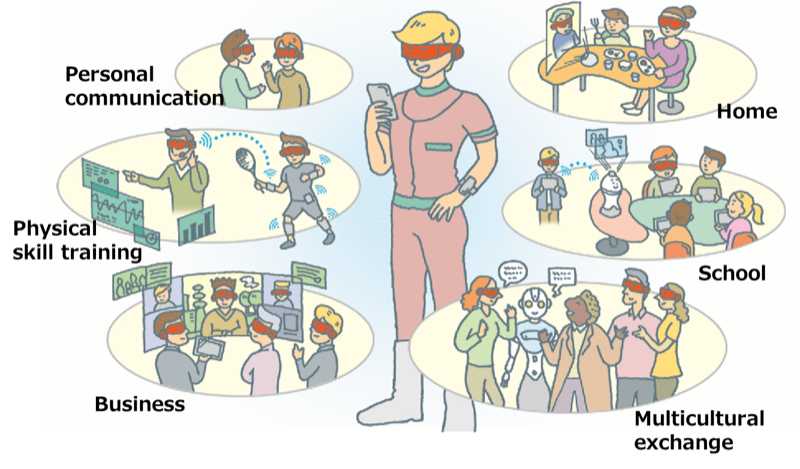R&D Project

Goal 9 R&D Projects (Selected in FY2021)Development of “Jizai Hon-yaku-ki (At-will Translator)” connecting various minds based on brain and body functions
Project manager (PM)TSUTSUI Ken-IchiroProfessor, Graduate School of Life Sciences, Tohoku University
Summary of the project
This project aims to develop a Jizai Hon-yaku-ki (At-will Translator) to support communications in various situations, contributing to an inclusive society. Neuroscientists, molecular biologists, and VR/AR and robotics engineers will collaborate to develop technologies to quantify states of mind and methods for perceptual, cognitive, and motor interventions. A Jizai Hon-yaku-ki will be produced by combining these technologies and methods, facilitating the communication of individuals and small groups.

Milestone by year 2032
- Establish a unified methodology of mind quantification based on physiological data from the brain, autonomous nervous system, and exosomes.
- Improve the functions of Jizai Hon-yaku-ki and establish a general method of userled R&D.
Milestone by year 2027
- Establish methods of multi-dimension mind quantification.
- Develop a prototype of Jizai Hon-yaku-ki.
R&D theme progress reports
- [1] Interpreting mental states through brain and autonomic nerves
- [2] Interpreting mental states through exosomes
- [3] Functions of Jizai Hon-yaku-ki
- [4 and 5] Social implementation of Jizai Hon-yaku-ki (neurodiversity / education)
- [6] Ethical, legal, and social issues (ELSI) involved in Jizai Hon-yaku-ki
- [A1] Development of long-term neural indicators linked to mental well-being
- Progress Report (1.45MB)
Performers
| Theme [1][5][8] | TSUTSUI Ken-Ichiro | Tohoku University |
|---|---|---|
| Theme [1] | SASAKI Takuya | Tohoku University |
| Theme [1][7] | KITAJO Keiichi | National Institute for Physiological Sciences |
| Theme [2] | HOSHINO Ayuko | The University of Tokyo |
| Theme [2] | NASIRI KENARI Amirmohammad | The University of Tokyo |
| Theme [3] | INAMI Masahiko | The University of Tokyo |
| Theme [3] | NAGAI Yukie | The University of Tokyo |
| Theme [3] | HOMAE Fumitaka | Tokyo Metropolitan University |
| Theme [3] | SAITO Hiroto | The University of Tokyo |
| Theme [3] | HARIYAMA Masanori | Tohoku University |
| Theme [4] | KUMAGAYA Shinichiro | The University of Tokyo |
| Theme [4] | NAKAMURA Motoaki | SHOWA Medical University |
| Theme [2][6] | OSUMI Noriko | Tohoku University |
| Theme [6] | HARA Saku | Tohoku University |
| Theme [6] | AKETANI Saeko | The University of Tokyo |
| Theme [6] | NAKAZAWA Eisuke | The University of Tokyo |
| Theme [7] | Sven Bestmann | University College London |
| Theme [A1] | Til Ole BERGMANN | Leibniz Institute for Resilience Research |
| Theme [A1] | Oliver TÜSCHER | Leibniz Institute for Resilience Research |
PDF Download
- Summary of the project (283KB)